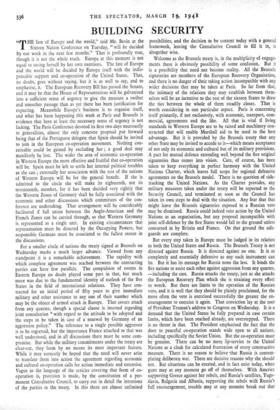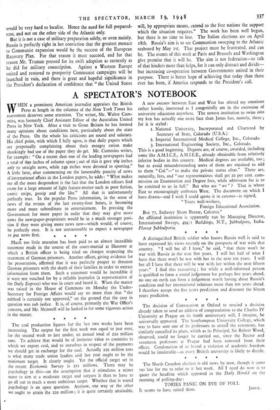BUILDING SECURITY "T HE fate of Europe and the world,"
said Mr. Bevin at the Sixteen Nation Conference on Tuesday, " will be decided by our work in the next few months." That is profoundly true, though it is not the whole truth. Europe at this moment is not equal to saving herself by her own exertions. The fate of Europe and the world will be decided by Europe itself with the indis- pensable support and co-operation of the United States. That, no doubt, goes without saying, but it is as well to say, and to emphasise, it. The European Recovery Bill has passed the Senate, and it may be that the House of Representatives will be galvanised into a sufficient sense of urgency to give the measure a swifter and smoother passage than as yet there has been justification for expecting. Meanwhile Europe's business is to organise itself, and what has been happening this week at Paris and Brussels is evidence that here at least the necessary sense of urgency is not lacking. The Paris Conference devoted its first two days necessarily to generalities, almost the only concrete proposal put forward being that of the Portuguese delegate that Spain should be invited to join in the European co-operation movement. Nothing con- ceivable could be gained by excluding her ; a good deal may manifestly be lost. The wider the area of economic co-operation in Western Europe the more effective and fruitful that co-operation will be. Spain must be left to settle her internal political troubles as she can ; externally her association with the rest of the nations of Western Europe will be for the general benefit. If she is admitted to the circle she will make its eighteenth, not its seventeenth, member, for it has been decided very rightly that the Western Zones of Germany shall be fully associated with the economic and other discussions which committees of the con- ference are undertaking. That arrangement will be considerably facilitated if full union between the Anglo-American and the French Zones can be carried through, so that Western Germany is represented as a single unit. In existing circumstances that representation must be directed by the Occupying Powers, but responsible Germans must be associated to the fullest extent in the discussions.
For a smaller circle of nations the treaty signed at Brussels on Wednesday marks a much larger advance. Viewed from any standpoint it is a remarkable achievement. The rapidity with which complete agreement was reached between the contracting parties can have few parallels. The compulsion of events in Eastern Europe no doubt played some part in that, but much more was due to the fundamental identity of outlook of the five States in the field of international relations. They have con- tracted for an initial period of fifty years to give immediate military and other assistance to any one of their number which may be the object of armed attack in Europe. That covers attack from any quarter, though a special clause is inserted regarding joint consultation " with regard to the attitude to be adopted and the steps to be taken in case of a renewal by Germany of an aggressive policy." The reference to a single possible aggressor is to be regretted, but the importance France attached to that was well understood, and in all discussions there must be some com- promise. But while the military commitments under the treaty are clear-cut, they form by no means its most important feature. While it may earnestly be hoped that the need will never arise to translate them into action the agreement regarding economic and cultural co-operation calls for action immediate and extensive. Vague as the language of the articles covering that form of co- operation is, provision is made, by the constitution of a per- manent Consultative Council, to carry out in detail the intentions of the parties to the treaty. In this there are almost unlimited possibilities, and the decision to be content today with a general framework, leaving the Consultative Council to fill it in, is altogether wise.
Welcome as the Brussels treaty is, in the multiplicity of engage- ments there is obviously possibility of some confusion. But it is a possibility that need not become reality. All the Brussels signatories are members of the European Recovery Organisation, and there is no danger of their taking action incompatible with any wider decisions that may be taken at Paris. So far from that, the intimacy of the relations they may establish between them- selves will be an incentive to the rest of the sixteen States to draw the ties between the whole of them steadily closer. That is worth considering in one particular aspect. Paris is concerning itself primarily, if not exclusively, with economic, transport, com- mercial, agreements and the like. All that is vital if living standards in Western Europe are to be raised and machinery con- structed that will enable Marshall aid to be used to the best advantage. But it is provided by the Brussels treaty that any other State may be invited to accede to it—which means acceptance of not only its economic and cultural but of its military provisions.
A pact for mutual defence extending well beyond the five original signatories thus comes into vision. Care, of course, has been taken to keep everything in perfect harmony with the United Nations Charter, which leaves full scope for regional defensive agreements on the Brussels model. There is no question of side- tracking the United Nations. As the Charter provides, any military measures taken under the treaty will be reported to the Security Council, and terminated as soon as the Council has taken its own steps to deal with the situation. Any fear that that might leave the Brussels signatories exposed to a Russian 'veto may be dismissed. Russia could indeed veto action by the United Nations as an organisation, but any proposal incompatible with joint self-defence by the five States would fall to the ground unless concurred in by Britain and France. On that ground the safe- guards are complete.
But every step taken in Europe must be judged in its relation to both the United States and Russia. The Brussels Treaty is not directed against Russia. It is directed against no one. It is as completely and essentially defensive as any such instrument can be. But it has its message for Russia none the less. It binds the five nations to assist each other against aggression from any quarter, —including the east. Russia attacks the treaty, just as she attacks the European Recovery Plan which she is straining every effort to wreck. But there are limits to the operation of the Russian veto, and it is well that they should be plainly proclaimed, for the more often the veto is exercised successfully the greater the en- couragement to exercise it again. That conviction lay at the root of President Truman's address to Congress on Wednesday. It is a demand that the United States be fully prepared in case certain limits, which have been reached already, are overstepped. There is no threat in that. The President emphasised the fact that the door to peaceful co-operation stands wide open to all nations, including specifically the Soviet Union. But the co-operation must be genuine. There can be no mere lip-service to the United Nations as a cloak for calculated frustration of every constructive measure. There is no reason to believe that Russia is contem- plating deliberate war. There are decisive reasons why she should not. But situations can be created, and in fact exist today, when guns may at any moment go off of themselves. With America supporting Greece against her rebels,. and Russia's satellites, Yugo- slavia, Bulgaria and Albania, supporting the rebels with Russia's full encouragement, trouble may at any moment break out that would be very hard to localise. Hence the need for full prepared- ness, and not on the other side of the Atlantic only.
But it is not a case of military preparation solely, or even mainly. Russia is perfectly right in her conviction that the greatest menace to Communist expansion would be the success of the European Recovery Plan. For that reason it must succeed, and for that reason Mr. Truman pressed for its swift adoption as earnestly as he did for military conscription. Against a Western Europe united and restored to prosperity Communist campaigns will be launched in vain, and there is great and hopeful significance in the President's declaration of confidence that " the United States will, by appropriate means, extend to the free nations the support which the situation requires." The work has been well begun, but there is no time to lose. The Italian elections are on April 18th. Russia's aim is to see Communism sweeping to the Atlantic seaboard by May ist. That project must be frustrated, and can be. The events of this week at Paris and Brussels and Washington give promise that it will be. The aim is not federation—to talk of that hinders more than helps, for it can only distract and divide— but increasing co-operation between Governments united in their purpose. There is better hope of achieving that today than there ever has been, if America responds to the President's call.































 Previous page
Previous page